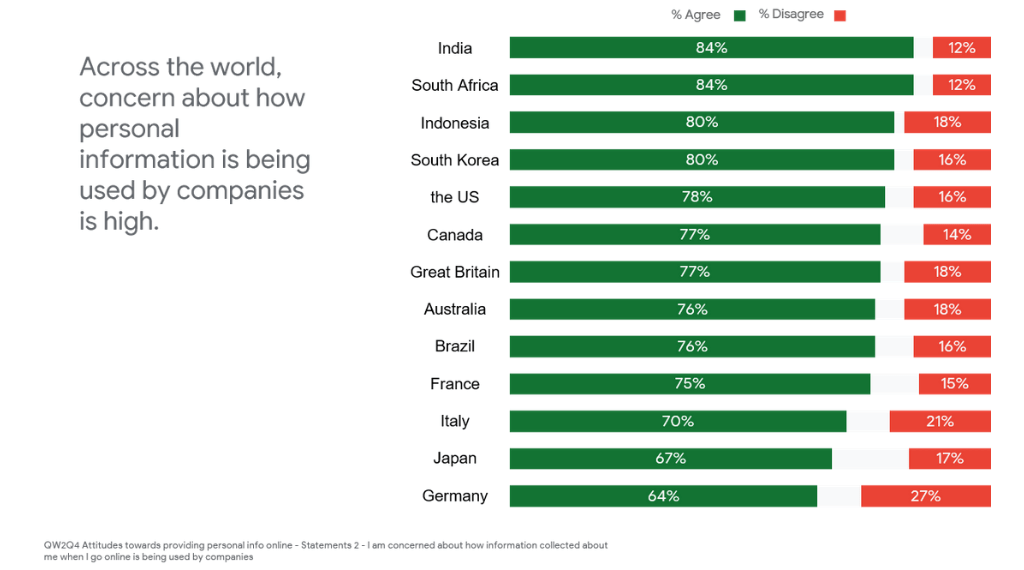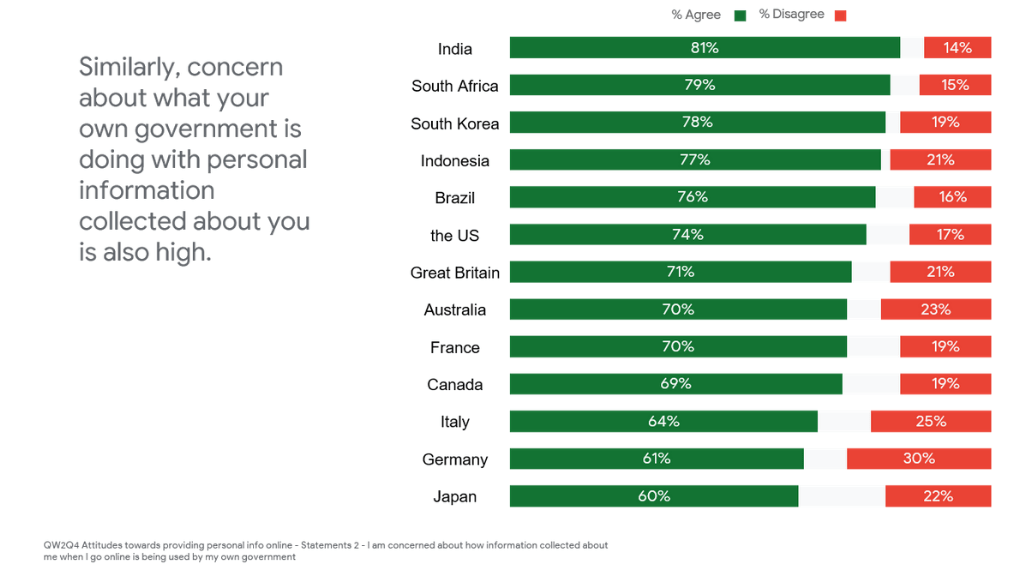The tech sector always bets that product quality will override privacy concerns
Stark evidence of this can be seen across two, relatively recent, product launches. Both of which have attracted major criticisms from privacy and digital rights campaigners, while at the same time being major commercial success stories.
Concerns around business and government use of personal information is high on a global scale
Let’s look at those concerns first – the 2020 Ipsos Global Trends survey1 shows in stark detail the level of concern that exists around the world about what is being done by companies and governments using the personal data being collected from people when they go online.


A rise in private sector surveillance
So, bearing such concerns in mind, let’s examine the news coverage of Amazon’s Ring product line over the last few weeks. Ring is a video doorbell system, which seems innocuous, but with millions sold what you end up with is a potential surveillance network the size of which has never been seen before, and all in the hands of Amazon. And what has Amazon done with it? For one it initially entered into partnership with a large number of law enforcement agencies in the US that allowed them access to the videos it records without a warrant being required. To quote from the Guardian, because of Ring “law enforcement are given a backdoor entry into private video recordings of people in residential and public space that would otherwise be protected under the fourth amendment”. While Amazon has recently extended its moratorium on sharing its facial recognition software with police, a ban it says that will stay in place until Congress creates the appropriate safeguards, it is puzzling why a similar approach to sharing data with law enforcement has not been adopted with Ring. Especially given the high-profile critique of the product by former Amazon software engineer Max Eliaser;
“The deployment of connected home security cameras that allow footage to be queried centrally are simply not compatible with a free society. The privacy issues are not fixable with regulation and there is no balance that can be struck. Ring should be shut down immediately and not brought back”
Now Amazon can certainly say that they are following the law as it exists and that the capabilities and requirements of the Ring product are all made available to the consumer at the point of sale. Amazon has acknowledged some of this controversy and has consequentially changed how police ask for video content, now requiring the police to ask for footage via the Ring Neighbors app, allowing local users to comment or assist as they judge best. However, to a background of high consumer concern about how personal data is being used and with Ring cameras being described as “a threat to privacy at best and a danger to society and democracy at worst”, critics may accuse Amazon of not thinking product features through a bit more carefully. That said, when they have a product that has shifted many millions of units in the US alone it is clear that, as ever, product utility quashes privacy concerns at point of purchase. A fact underlined by the 4.6 rating the Ring 3 has on Amazon.com, a rating based on 33,000+ reviews.
From surveillance to tracking
Enough with Amazon, I hear the tech fans cry, that’s just one of the major brands. Well, let's turn to Apple and its brand-new gadget - the AirTag. A device sold as the means to find things you have lost, via a Bluetooth signal that alerts sympathetic devices that are web-enabled. Perfect for finding your luggage, your car, or, as has been pointed out by a wide range of news agencies, the person you are stalking.
Apple has attempted to build in safeguards to prevent “unwanted tracking” but the slew of media coverage over the last few weeks that point out how ineffective those safeguards are in practice probably shows how little thought the designers of this product put into thinking about the downsides of this product compared to the potential upsides. The warning sound that alerts the user to unwanted tracking is easily missed, and while people with an iPhone might be able to find unwanted AirTags those with Android phones cannot (right now).
While plenty of apps, charmingly called “stalkerware”, exist to help one person track another, and there are other products similar to AirTags where the manufacturers have put far less effort into stopping them from being used for nefarious purposes than Apple has. However, part of the surprise here is that, as The Washington Post articulates well “AirTags show how even Apple, a company known for emphasizing security and privacy, can struggle to understand all the risks involved in creating tech that puts everyday things online”. This disconnect between a company that is often praised for its firm stance on personal privacy and the potential misuse of this product is vast and easily fixed with little effort. As Wired suggests “Apple leadership needs to give abuse survivors and experts a central place in its development process, incorporating their feedback from the start. Otherwise, the company will continue to make products that endanger people more than they help”.
Responding to this wave of criticism Apple has announced some changes – reducing the amount of time before an AirTag starts beeping once it is away from its owner's iPhone and promising an Android application as well. Just like Amazon with Ring its good to see Apple responding to the issue, but it again raises the question of how a product like this got to market with these issues when Apple usually takes these issues so seriously. That said, just as with Amazon’s Ring it is highly likely that this product will sell incredibly well despite any privacy concerns due to its sheer usefulness. In fact one industry analyst in Forbes confidently predicts its success, and possible billion dollar revenue for Apple, due to the vast number of devices the product can connect to and the popularity of the Find My app among Apple product users.
Consumers value privacy – as well as products that make their lives easier
Ultimately the tech sector knows its customers very, very well and knows that while there are people who may not buy these products because of privacy issues there are far more people who will ignore those concerns and buy them anyway. Negative media coverage of the like described above will have very little impact on the level of individual customers. That said, increased media focus on perceived privacy issues reinforces some of the negative reputational themes that affect the tech sector and the brands within it and are currently fuelling many of the debates that are ongoing around the world among legislators thinking of new regulation. Innovative new products that skirt the edge of what is appropriate, or legal, when it comes to privacy is one thing, as long as they are profitable, but fuelling the fires of regulation is another. The tech sector may want to ponder this.
- Markets: Argentina, Albania, Australia, Belgium, Brazil, Canada, China, Chile, Colombia, Denmark, France, Germany, Great Britain, India, Indonesia, Italy, Japan, Mexico, Peru, Poland, Russia, Romania, Serbia, Saudi Arabia, South Africa, South Korea, Spain, Sweden, Turkey, and the United States.
Method The survey for the 2020 edition was carried out online using the Ipsos Online Panel, and face to-face interviewing in Albania, Montenegro and Serbia. The results are weighted to ensure that the sample’s composition reflects that of the adult population according to the most recent country census data. Total global data has not been weighted by population size, but are simply a country average. Fieldwork dates June-July 2019





![[Webinar] KEYS: What can we learn from what happened in 2025?](/sites/default/files/styles/list_item_image/public/ct/event/2025-12/keys-webinar-what-happened-in-2025-carousel.webp?itok=1gJKCCxx)